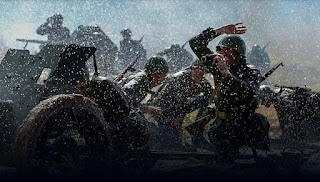During the Barbarossa invasion beginning in 1941, the armoured vehicles and tanks of the third Reich are only 200 kms from Moscow. There seems to be little chance of stopping them. The only hope for the High Command of the Red Army is to send 3,500 officer students from the military school of Podolsk to defend the Ilyinsky line. This at all costs, until reinforcements arrive. The cadets have small, moveable field artillery to counter the German tanks. They are accurate but not always powerful enough. One has to aim at the tank turrets to put the tanks out of action.
The film (on Prime Video) is based on historic facts authenticated by the Russian ministry of Culture. The cadets are ordered to hold the front line for an estimated four day period to prevent the German and Axis troops from breaking through to Moscow. They held out for 12 days before the Red Army reinforcements and tanks finally arrived.
The only language available for this Russian film banally called ‘Ligne de feu’ (Line of Fire) is French. I refer to this film simply because one notes that there is very little difference between the characters, their emotions, fear, courage, loyalty to their brothers in arms, the realistic scenes, often atrocious but how it then was, and the more serious American WWII films produced by good film directors. In other words the film showed that the cadets spoke and joked just as American soldiers would under the same circumstances. Naturally there were no stupid, Western, caricatures of Russian underdogs brutally ordered to commit suicide by callous, oldschool, Commanding Officers. Obviously the officers in the film had to obey High Command orders, but they cared for their men and did their best to protect them.
There’s a scene where a soldier volunteers to mend a broken fuse cable to blow up a bridge. He gets shot but finishes the job and sacrifices his life when the bridge is successfully destroyed. These are the same scenes, the same acts of personal sacrifice and courage that one sees in serious, Anglo-Saxon, WWII films. The film highlights the reality of what took place, the considerable initial success of the advance of German and Axis troops at the start of the invasion.
It’s not a film of propaganda. It wasn’t made to portray an indomitable hero like ‘Rocky’, who won the war single-handedly, or other Western war film heroes played by Audie Murphy or Robert Mitchum, etc., those one sometimes admired in the 60’s and 70’s US war films.
The film ends with the survivors, the young heroes, many of whom are wounded, stoically marching by the large convoy of reinforcements which has at last arrived. The reinforcements are well armed and have brand new tanks, etc. The soldiers and officers salute the cadets with great respect and admiration. Once more one is reminded of similar Western film scenes of such honour, respect, duty and sacrifice.
This was the USSR, the West’s precious ally, as from 1941, remember? The nation without which there could never have been a Normandy invasion. The Russian Federation, no longer communist, now treated like dirt by stupid, ignorant Western leaders. But that’s another tragic story.
The history referred to above, a moving story of human courage, is not only factual history; it clearly, discreetly and inadvertently shows that there’s no essential difference of character between Russians and Anglo-Saxons, of normal humanity trying to make the best of things in nightmarish situations.
No nation has the monopoly of ‘goodness', of ‘exemplary righteousness'. Similarly, no fake religion, or dogma, can claim to have the monopoly of God, certainly without being blasphemous. Evil exists, but one must be able to recognise it, rather than try to project it where it doesn’t exist, for the sake of absurd, impossible ideology, or irresponsible and dangerous illusions.
Text © Mirino. (Photo from film title page, with thanks) August, 2024





No comments:
Post a Comment